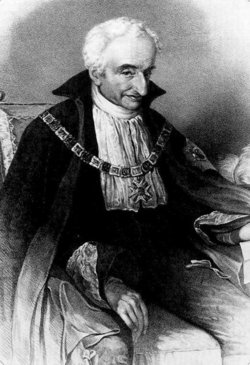Born in the Bavarian capital Munich, he was educated successively at Nancy, Strasbourg and Ingolstadt. He then entered the Bavarian administration, where initially he got into difficulties when his engagement for the Illuminati, an anti-clerical movement of the Aufklärung, became known.
Things improved when his princely protector Maximilian Joseph became Duke of Bavaria and made him Minister. Montgelas participated at the Rastatt congress of 1798. In the mean time Germany had come under French hegemony. In all states, reforms of politics, economy and society were introduced according to French models. The Bavaria of Montgelas, which by Napoléon's grace became a Kingdom, was a vanguard of these tendencies: Modern ministries and a merit-based civil service was created; torture was abolished; the separation of church and state accentuated, with respect to education, and by a secularisation of property.
In 1817, Montgelas was dismissed. He spent the rest of his life in high esteem, as member of the Lord's chamber of the Bavarian parliament.
Born in the Bavarian capital Munich, he was educated successively at Nancy, Strasbourg and Ingolstadt. He then entered the Bavarian administration, where initially he got into difficulties when his engagement for the Illuminati, an anti-clerical movement of the Aufklärung, became known.
Things improved when his princely protector Maximilian Joseph became Duke of Bavaria and made him Minister. Montgelas participated at the Rastatt congress of 1798. In the mean time Germany had come under French hegemony. In all states, reforms of politics, economy and society were introduced according to French models. The Bavaria of Montgelas, which by Napoléon's grace became a Kingdom, was a vanguard of these tendencies: Modern ministries and a merit-based civil service was created; torture was abolished; the separation of church and state accentuated, with respect to education, and by a secularisation of property.
In 1817, Montgelas was dismissed. He spent the rest of his life in high esteem, as member of the Lord's chamber of the Bavarian parliament.
Advertisement
Advertisement




